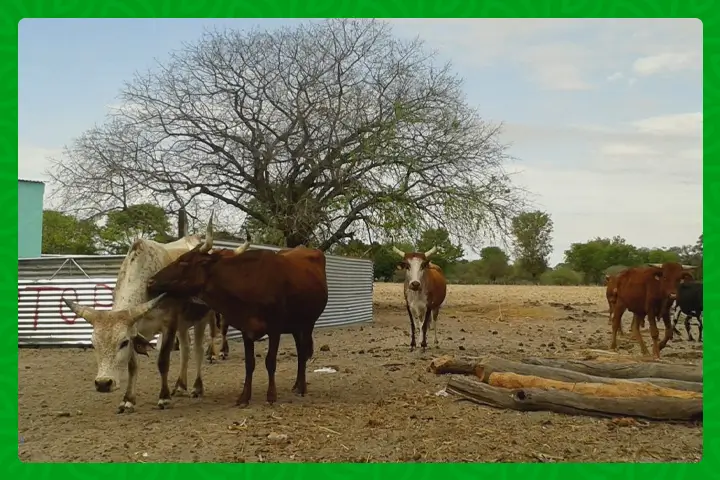
In the arid heartland of Namibia, a growing crisis is unfolding. With a burgeoning cattle population in the northern central regions, local farmers are facing a dire shortage of grazing space, aggravated by the harsh clutches of an unrelenting drought. Faced with the urgent need to secure sustenance for their livestock, Namibian cattle herders have turned their eyes towards Angola, where the pastures appear to promise salvation.
The dire situation has caught the attention of regional authorities, with Ohangwena Regional governor, Walde Ndevashiya, making a clarion call for action. This article delves into the pressing issue of a lack of grazing space and the escalating farmer migration into Angola, where their herds seek refuge from the parched lands of Namibia.
A Searing Problem:
The northern regions of Namibia are home to approximately 1.2 million cattle, but the unfolding crisis stems from the stark reality of minimal slaughtering due to market issues. Ohangwena, in particular, boasts a substantial cattle population estimated at around 360,000, second only to Otjozondjupa, which tallies at an estimated 495,000 cattle. These numbers, staggering as they are, have exposed a glaring issue – the inadequate grazing space in the communal areas.
The Drought Dilemma:
Namibia’s crippling drought conditions have exacerbated the problem, compounding the scarcity of grazing land and forcing farmers into desperate measures. The vast majority of available land has been allocated for housing and cultivation, primarily of mahangu. As a result, the cattle are left with fewer and fewer pastures to roam, intensifying the need for alternative solutions.
A Tradition Takes Root:
For many years, taking cattle for grazing and establishing cattle posts in Angola has been a cultural tradition among Namibian livestock farmers. In fact, it’s estimated that these enterprising farmers have set up approximately 400 cattle posts, or “farms,” in Oshimholo and the surrounding areas. This migration is not a recent phenomenon; 18 years ago, farmers from the northern regions took their herds to the southern Cunene and Cuando Cubango provinces of Angola after they were ejected from the Kavango West.
The Call for Regulation:
Amid this brewing tension, Governor Ndevashiya emphasizes the importance of grazing permits for anyone wishing to take their cattle into Angola. These permits are issued by the traditional authority in the farmer’s respective area of origin. He underlines the need for adherence to Angolan laws, particularly those governing grazing activities, to ensure that Namibians in Angola operate legally and peacefully.
Angola’s Evergreen Pastures:
Namibian farmer Immanuel Nangolo, who lives just 10 kilometers from the Angola-Namibia border, highlights the allure of Angola’s vast, evergreen pastures. In contrast to Namibia’s perpetually dry conditions, Angola’s lush grazing fields promise not only sustenance but also substantial weight gain for the cattle. He lauds the call for grazing permits, acknowledging the need for a more organized approach, replacing the past practice of entering Angola illegally in search of greener pastures.
A Diplomatic Solution:
The escalating situation has caught the attention of higher authorities, with Deputy Prime Minister and Minister of International Relations and Cooperation, Netumbo Nandi-Ndaitwah, engaging in bilateral discussions with her Angolan counterpart. The two ministers have agreed to undertake a Joint Working Visit to the Cunene Province of Angola and the Ohangwena Region of Namibia. Their aim is to promote peaceful co-existence and good neighborliness along the common border while ensuring that Namibians grazing in Angola do so in compliance with Angolan laws and regulations.
The challenge of a lack of grazing space and a relentless drought has driven Namibian farmers to venture into Angola in search of salvation for their herds. This centuries-old migration tradition has been further fueled by the lush, evergreen pastures that Angola provides, promising not only sustenance but thriving cattle populations.
However, the call for regulation and adherence to Angolan laws is crucial to maintain peaceful co-existence between these neighboring nations. The proposed Joint Working Visit offers hope for a diplomatic solution to the crisis, reinforcing the importance of compliance and peaceful coexistence. As the situation unfolds, it remains clear that a harmonious balance between cattle herders and the environment is essential for the well-being of both nations.
Stay updated with the latest farming tips and agriculture industry news from Africa by subscribing to our newsletter. Don’t miss out on valuable insights and updates. Follow us on Twitter, LinkedIn, and Facebook to join our farming community and stay connected with us.



















